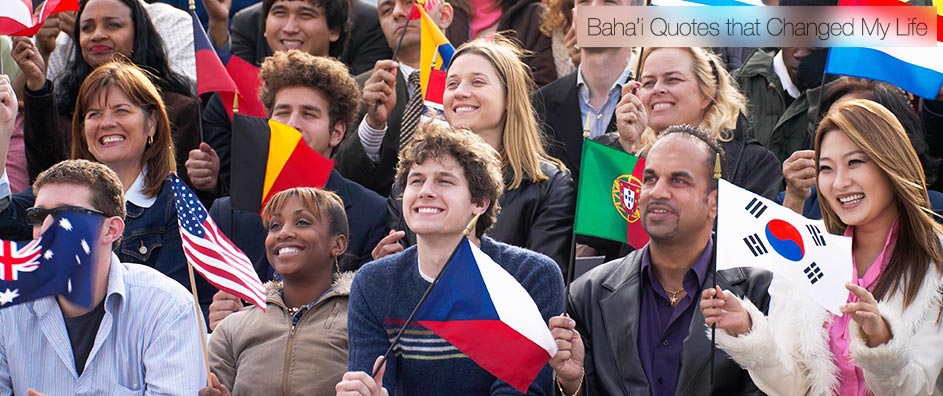The views expressed in our content reflect individual perspectives and do not represent the authoritative views of the Baha'i Faith.
These two Baha’i quotes changed my life:
No two men can be found who may be said to be outwardly and inwardly united. The evidences of discord and malice are apparent everywhere, though all were made for harmony and union. — Baha’u’llah, Tablets, p. 163.
The well-being of mankind, its peace and security are unattainable unless and until its unity is firmly established. This unity can never be achieved so long as the counsels which the Pen of the Most High hath revealed are suffered to pass unheeded. — Baha’u’llah, Gleanings, p. 186.
How, you may ask?

Alain Locke
When I read the first quote (in 1978), I was wonderstruck, thunderstruck, awestruck, dumbstruck — in a word, stunned.
This thought had never occurred to me before: “No two men can be found who may be said to be outwardly and inwardly united.” From that point forward, I resolved to do my best to understand what “unity” truly means — and to best understand the means to true unity. For “unity” is the essence of the Baha’i message.
From family relations to international relations, Baha’i believe unity defines the new “Gospel” for the world today.
Alain Leroy Locke (1885–1954), the most influential African American intellectual born between W. E. B. Du Bois and Martin Luther King Jr., became a Baha’i in 1918. Locke wrote:
The gospel for the Twentieth Century rises out of the heart of its greatest problems, and few who are spiritually enlightened doubt the nature of that problem. The clashing ominous nest of issues of the practical world of today, the issues of race, sect, class and nationality, all have one basic spiritual origin, and for that reason, we hope and believe one basic cure. …
The redemption of society, social salvation, should have been sought after first … The salvation we have sought after as individuals in an after-life and another sphere must be striven for as the practical peace and unity of the human family here in this world.
For years (literally, decades), I meditated, cogitated, expatiated on “unity.” Finally, I made a list, which will be published fairly soon: “Fifty Baha’i Principles of Unity: A Paradigm of Social Salvation,” Baha’i Studies Review, 18 (2012) (in press).
Here’s the list:
Fifty Baha’i Principles of Unity
I. Types of Unity as Propounded by Baha’u’llah:
The Tablet of Unity
1. Unity in Religion
2. Unity in Speech
3. Unity in [Ritual] Acts
4. Unity of Station
5. Unity of Souls
6. Unity of People and Wealth
7. Unity of God
II. Types of Unity as Propounded by Baha’u’llah:
Other Types of Unity
8. Unity of Existence (Oneness of Being) and Manifestation
9. Unity of the Manifestations of God
10. Spiritual Oneness
11. Unity Among Religions
III. Types of Unity as Defined by ‘Abdu’l-Baha:
The Seven Candles of Unity
12. Unity in the Political Realm
13. Unity of Thought
14. Unity in Freedom
15. Unity in Religion
16. Unity of Nations
17. Unity of Races
18. Unity of Language
IV. Types of Unity as Defined by ‘Abdu’l-Baha:
Other Types of Unity
19. Unity of All Mankind/World Unity
20. Unity of Species
21. Unity of Truth
22. Unity of Conscience
23. All-Unifying Power
24. Unity of Science and Religion
25. Unity of the Rights of Men and Women
26. Unity in Education
27. Unity of Husband and Wife
28. Unity of the Family
29. Baha’i Unity
30. Unity among Baha’i Women
31. Unity of Emotions
32. Unity of the Nations/International Unity
33. Unity of the Spiritual Assembly
34. Unity of The Universal House of Justice and Governments
V. Types of Unity Articulated by Shoghi Effendi:
Foundations of Baha’i Administration and the Future World Commonwealth
35. Unity in Diversity
36. Unity of the Baha’i Revelation
37. Unity of Doctrine
38. Unity of Administration
39. Evolving Social Unities
40. Unity of the World Commonwealth
VI. Other Unities
41. Mystic Unity of God and His Manifestations
42. Unity of Meaning
43. Unity of Doctrine
44. Unity of Vision
45. Unity of Action
46. Unity of Purpose
47. Unity of Means
48. Unity with the Environment
49. Unity of the Free
50. Eye of Oneness
This list summarizes just some of the facets of the Baha’i “Gospel of Unity,” which Baha’u’llah encompasses this way:
O ye that dwell on earth! The distinguishing feature that marketh the pre-eminent character of this Supreme Revelation consisteth in that We have, on the one hand, blotted out from the pages of God’s holy Book whatsoever hath been the cause of strife, of malice and mischief amongst the children of men, and have, on the other, laid down the essential prerequisites of concord, of understanding, of complete and enduring unity Well is it with them that keep My statutes. – Baha’u’llah, Tablets, p. 94.
©2013 by Christopher Buck.
















Comments
Sign in or create an account
Continue with Googleor